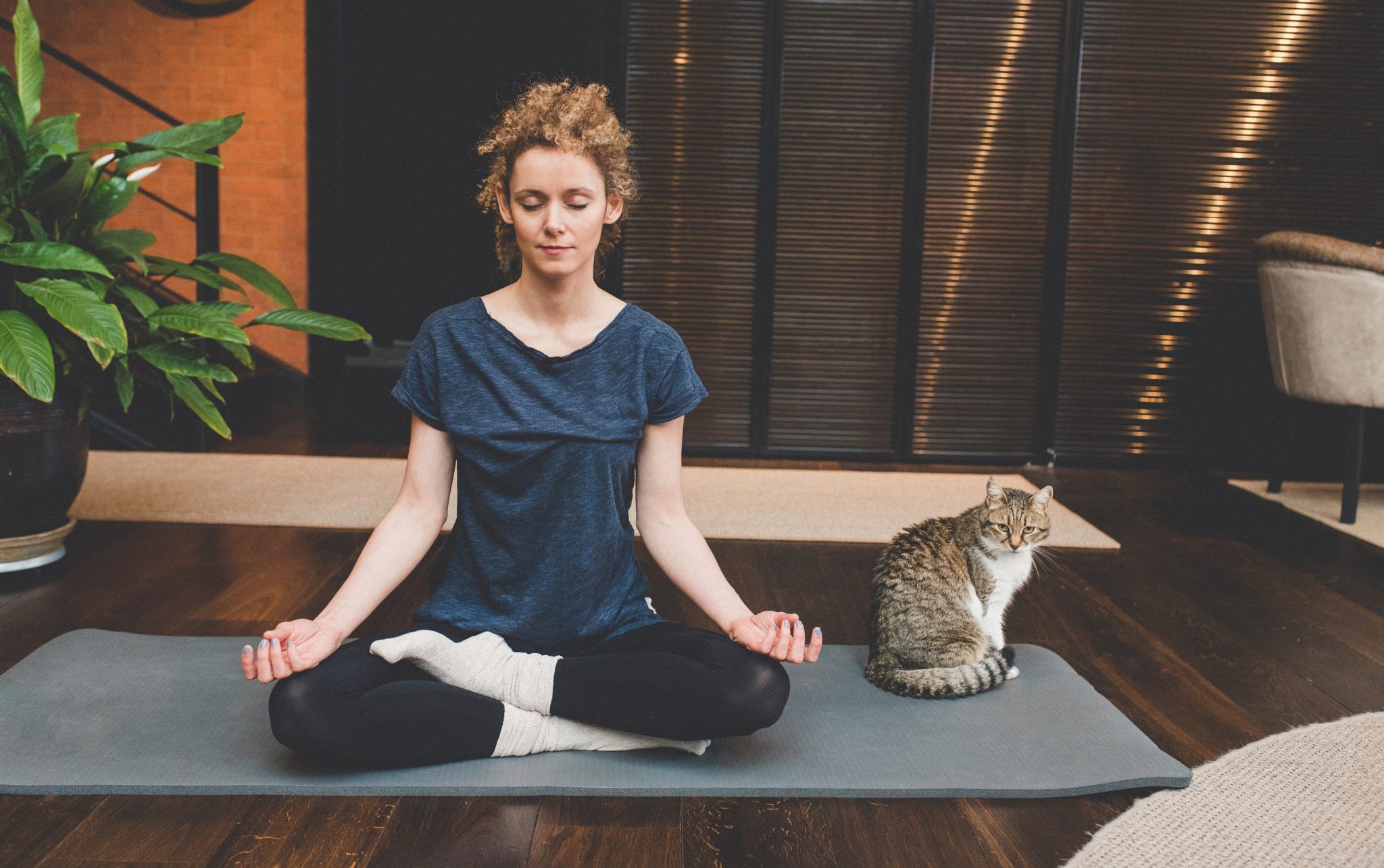Stress compromises the immune system. Not only can it leave you feeling drained emotionally, but physically worse off as well. While there’s no use pretending to be happy when you’re feeling ill, there is evidence to suggest that mindfulness could help you recover faster.
Joining us today as we unwrap mindfulness and sickness is Alicea Ardito from Choosing Therapy. Alicea is a Licensed Clinical Social Worker and an expert in mental health. She’ll help us discover why mindfulness is such an effective tool, precisely where it can help and how to employ mindfulness successfully to get real results for your mind and body.
 Let’s begin. What is mindfulness, anyway?
Let’s begin. What is mindfulness, anyway?
“Mindfulness is conscious, non-judgmental awareness; it is a state of being fully present in the moment.” – says Alicea
So, should we focus on being sick then? Wouldn’t that make us feel even worse? No. In fact, evidence suggests that mindfulness can help reduce stress and help us recover faster.
“There are many positive impacts that mindfulness can have on health, especially mental health. People who practice mindfulness may have a greater ability to focus on the present moment and have less worry about the past or future.”
Simply, mindfulness is all about paying attention to what is going on around you in the present. Too often we focus on the worries of the future or have anxiety about the past. Mindfulness takes us away from these concerns and encourages us to focus on the now.
So, how does mindfulness help when you're ill?
First, let’s take a look at the connection between stress and sickness. Often, we find that these two are intertwined. When we are stressed, especially if this occurs over a longer period of time, we are more likely to become sick. But why?
The truth is, no one knows. Science has yet to establish the full picture of why emotional stress affects physical health. But here’s what we know so far.
In 1991, a research paper released by The New England Journal of Medicine suggested that emotional stress made a person more likely to catch a virus and affect the immune system. Later research suggested that this was due to the role of the inflammatory response in an illness.
When we are stressed our body’s release cortisol, a stress hormone. But this is where the plot thickens. No direct connection between cortisol and health outcomes can be established. However, it’s suspected that the key lies in how our bodies react to the cortisol levels in our blood.
What this means is when our bodies are stressed, whether this is from emotional stress or a physical viral illness, it leaves us more susceptible to disease.
But, then, how can mindfulness help?
“Mindfulness can help enhance the healing process because it can increase acceptance and tolerance, rather than avoidance, and at times this is a desired outcome.” – Explains Alicea
In turn, this can help reduce overall stress levels which negatively impact the body. But it’s not only a psychological trick.
“Mindfulness can help to bring physical comfort in many ways. It allows us to become still and present in the moment. Often, when we are experiencing what we perceive to be a negative physical sensation, we are unknowingly passing judgement and attaching negative thoughts and beliefs to the sensation which creates greater discomfort.” – Continues Alicea
“Take the physical sensation of pain as an example. When we feel pain and attach negative thoughts and emotions to the pain, we have now created emotional turmoil.”
And it is this emotional turmoil that is the barrier to health and healing.
Think about the experience of going to the dentist. In your mind, you know that you need this work done. However, at the same time, you know it will hurt to some degree or another. The body’s natural reaction is to avoid pain. And especially if you’re nervous, this may make you stressed. In this your heart rate may begin to rise, you may feel sweaty, and even experiencing shaking. This is acute stress.
Untamed, in a worst-case scenario, it can render you unable to cope with the situation. This can lead to panic attacks, fainting, etc. Making it harder for you and your care provider.
By engaging in mindfulness, you can help your body to remain in a calm state, leading to better health outcomes.
But let’s dive a little deeper. Why exactly does mindfulness help?
“In addition to the physical pain we may now also be feeling anger, “Why is this happening to me again?”, or frustration “Now I won’t be able to finish my work assignment!”, or worry “I don’t know why I feel this way and it makes me anxious”.
If we are simply aware of the physical sensation of pain without attaching judgement to it, we may be able to better tolerate the physical sensation and also shift awareness to something else we are experiencing in the present moment.” – Explains Alicea
In short, by focusing our mind on the present moment, we are less likely to focus on presumed pain or worry that comes from the event itself. Simply, we accept things as they are and do not allow unnecessary stress to impact our lives.
 Stress, sickness and mindfulness: Quick FAQs
Stress, sickness and mindfulness: Quick FAQs
Understanding how these three giants are interconnected might seem like a challenge. Let’s take a moment to recap with some fast FAQs.
What effect does stress have on the body?
Stress causes both a psychological and chemical effect on the body. It releases the hormone cortisol into the bloodstream.
Cortisol has an impact on almost all the body’s systems from the nervous system to immune system, reproductive to cardio health and everything in between, making it one important chemical.
Prolonged exposure to stress can:
- Lower the immune system
- Affect your mood
- Impair concentration
- Create feelings of lethargy
- Increase sensitivity to pain
- Cause depression and other mood disorders
How can mindfulness help?
Mindfulness is a technique that can be used to gain control over your body and impact how you react to the stimuli around you both physically and psychologically. It can:
- Reduce worry about things that may or may not happen
- Help you accept the things you cannot change
- Give you a sense of calm and the ability to cope
- Help you better manage your condition
What can mindfulness not do?
While there are many benefits to practicing mindfulness, there are some things the technique cannot do. For example:
- Immediately heal you from all illnesses
- Cure a psychiatric condition. For this, you need to consult a doctor
- Fully help you manage a phobia, for example, a fear of needles. To combat such deep-rooted fears, a more complex approach may be required
 Top 3 mindfulness tricks to get you started
Top 3 mindfulness tricks to get you started
Practicing mindfulness is what it says on the box – practice. To make mindfulness work for you and your needs, you’ll need to dedicate your time to it each day. Here are some of our best tricks to get you started.
1. Simple mindfulness practice
To start our journey, Alicea has shared her favorite mindfulness technique with us. This one is simple and easy to do, so you can try out these steps below:
- First, become still, either seated or lying down and close your eyes.
- Begin to bring awareness to your breathing and use your breath to scan your body. As you scan your entire body, notice how you feel. Become an observer of how you feel.
- Next, begin to widen your awareness to what is going on around you, the noises inside and outside of the room. Become an observer of the sounds around you.
- Be aware of any thoughts that travel through your mind. Allow them to pass through your mind without judgement. Think the thought, and let it go. You are an observer of your thoughts.
- Remain in this state of awareness for as long as you are comfortable.
2. One object focus
When you’re ill, it might seem all about the symptoms you are experiencing this moment and how awful they make your body feel. This technique focuses on one single object around you to direct your focus away from pain and center your mind to help you relax.
- Sit down on the floor. Make sure you are relaxed and comfortable.
- Now choose an object in the room. Perhaps you see an apple or another piece of fruit. Or even something else.
- Take a deep breath in. Hold for a moment and release.
- Next, keep your focus on your chosen object. While doing controlled breaths in and out, keep your attention only on that one object.
- Ask yourself, how does it look (smooth, rough, shiny, hard), how does it feel (is the skin soft, waxy, or something else) how does it smell (sweet, light, heavy) and how does it tasty (if you have chosen something edible).
- Imagine reaching out and touching the object. Keep breathing as you do.
- And that’s it.
By the end of your exercise, you should find that your focus is directed away from your symptoms and onto something more positive around you.
3. Explore some of our tried and tested deeper stress relief techniques
Once you’ve practiced for a while, you might want to take your mindfulness journey further. In this article, we explore some of the best mindfulness techniques for deeper sleep and stress relief.
Increasing your rest while you’re ill can help you recover faster. That’s why learning how to unlock that relaxation potential is such a helpful mindfulness trick.


 Let’s begin. What is mindfulness, anyway?
Let’s begin. What is mindfulness, anyway? Stress, sickness and mindfulness: Quick FAQs
Stress, sickness and mindfulness: Quick FAQs Top 3 mindfulness tricks to get you started
Top 3 mindfulness tricks to get you started
